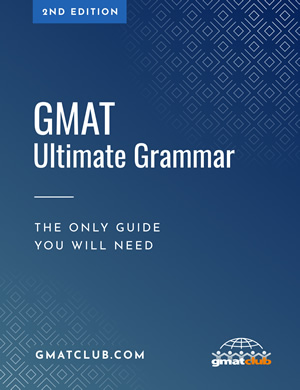Events & Promotions
|
|

GMAT Club Daily Prep
Thank you for using the timer - this advanced tool can estimate your performance and suggest more practice questions. We have subscribed you to Daily Prep Questions via email.
Customized
for You
Track
Your Progress
Practice
Pays
Not interested in getting valuable practice questions and articles delivered to your email? No problem, unsubscribe here.
- Nov 18
11:00 AM PST
-12:00 PM PST
Join us in a live GMAT practice session and solve 30 challenging GMAT questions with other test takers in timed conditions, covering GMAT Quant, Data Sufficiency, Data Insights, Reading Comprehension, and Critical Reasoning questions. - Nov 22
11:00 AM IST
-01:00 PM IST
Do RC/MSR passages scare you? e-GMAT is conducting a masterclass to help you learn – Learn effective reading strategies Tackle difficult RC & MSR with confidence Excel in timed test environment - Nov 23
11:00 AM IST
-01:00 PM IST
Attend this free GMAT Algebra Webinar and learn how to master the most challenging Inequalities and Absolute Value problems with ease. - Nov 25
10:00 AM EST
-11:00 AM EST
Prefer video-based learning? The Target Test Prep OnDemand course is a one-of-a-kind video masterclass featuring 400 hours of lecture-style teaching by Scott Woodbury-Stewart, founder of Target Test Prep and one of the most accomplished GMAT instructors.
 GMAT Club's Ultimate Grammar Book, 2nd Edition
GMAT Club's Ultimate Grammar Book, 2nd EditionThis PDF version of the book is provided by GMAT Club for free personal use
Download Now
Sept 16, 2020: The second updated and revised edition of the GMAT Club's Ultimate Grammar Book is Here! Huge thanks to generis and GMATNinja for their help with the latest revision. generis alone has made 750 improvements, corrections, and updates to the book and it is awesome. Countless hours have gone into the revision of this guide and I hope you can use it to get a better score!
First published in 2012, GMAT Ultimate Grammar has been downloaded over 100,000 times. The Ultimate Grammar is the result of many years of searching and coming up short of a grammar book that could be valuable for non-native speakers while being applicable to the GMAT. It is designed to help international students who aim to improve their English and Grammar skills before taking the SC and becoming better English writers. The guide is designed to be to the point, without fluff, and to focus on the main points.
Features:
✓ The best GMAT grammar resource available
✓ 500+ exercises and 500+ test questions in this 272 page book!
✓ Covers all necessary items from Articles to Parallelism
✓ List of common idioms (plus examples), prepositions, commonly confused, misused words
✓ Split into Beginner, Intermediate, and Advanced section for proper levels
✓ Includes 4 tests
Thank you,
BB, Founder of GMAT Club
Attachment:
For other great verbal resources visit the GMAT Club's Verbal Advantage
You may also be interested in downloading the GMAT Club's Math Book
Chapters posted on the Forum
- Basic English Sentence Structure- Nouns
- Verbs
- Linking Verbs
- Common Distinguishments
- Proper Use of Problem Verbs
- Subject/Verb Agreement & Placement
- Pronouns
- Questions
- Adjectives and Adverbs
- Coordinating Conjunctions Part I
- Prepositions and Prepositional Phrases
- Comparisons
- Commands
- Negation – Part I - Using Not
- Double Negatives
- Answers to Exercises
- Coordinating Conjunctions: Part II
- Relative Clauses
- Gerunds and Infinitives
- Causative Verbs
- Affirmative Agreement (So/Too)
- Negation - Part II
- Modal Auxiliary Verbs
Attachment:
grammarbookfb2.png [ 295.15 KiB | Viewed 768918 times ]
Attachment:
File comment: Updated Grammar Book- Oct 9, 2012
 GMAT Grammar book Oct9 2012.pdf [2.97 MiB]
GMAT Grammar book Oct9 2012.pdf [2.97 MiB]
Downloaded 3902 times
Downloaded 3902 times
Attachment:
Attachment:
Attachment:
Attachment:
Attachment:
Originally posted by PureReason on 11 Apr 2018, 04:00.
Last edited by PureReason on 12 Apr 2018, 05:52, edited 1 time in total.
Last edited by PureReason on 12 Apr 2018, 05:52, edited 1 time in total.
Kudos
Bookmarks
Maybe there is a scope of correction:
Practice Test 1
Basic Level
Question 5
Due to traffic being backed up, by the time I arrived at my parent’s house the reunion was
over for hours and all my relatives have gone.
As mentioned by sayantanc2k in another post (https://gmatclub.com/forum/gmat-club-gr ... 64119.html) it should be BECAUSE OF rather than DUE TO. I am curious to know correct usage.
Also should I use RATHER THAN or INSTEAD OF in above sentence
Will these quantities act as NOUN because of the way I have used them in my sentence?
Edit: I think it should be INSTEAD OF
Practice Test 1
Basic Level
Question 5
Due to traffic being backed up, by the time I arrived at my parent’s house the reunion was
over for hours and all my relatives have gone.
As mentioned by sayantanc2k in another post (https://gmatclub.com/forum/gmat-club-gr ... 64119.html) it should be BECAUSE OF rather than DUE TO. I am curious to know correct usage.
Also should I use RATHER THAN or INSTEAD OF in above sentence
Will these quantities act as NOUN because of the way I have used them in my sentence?
Edit: I think it should be INSTEAD OF
Kudos
Bookmarks
PureReason
Thank you. I will look into both of these posts and update over the weekend. Any other typos, please post here. I will review and update the file accordingly.













